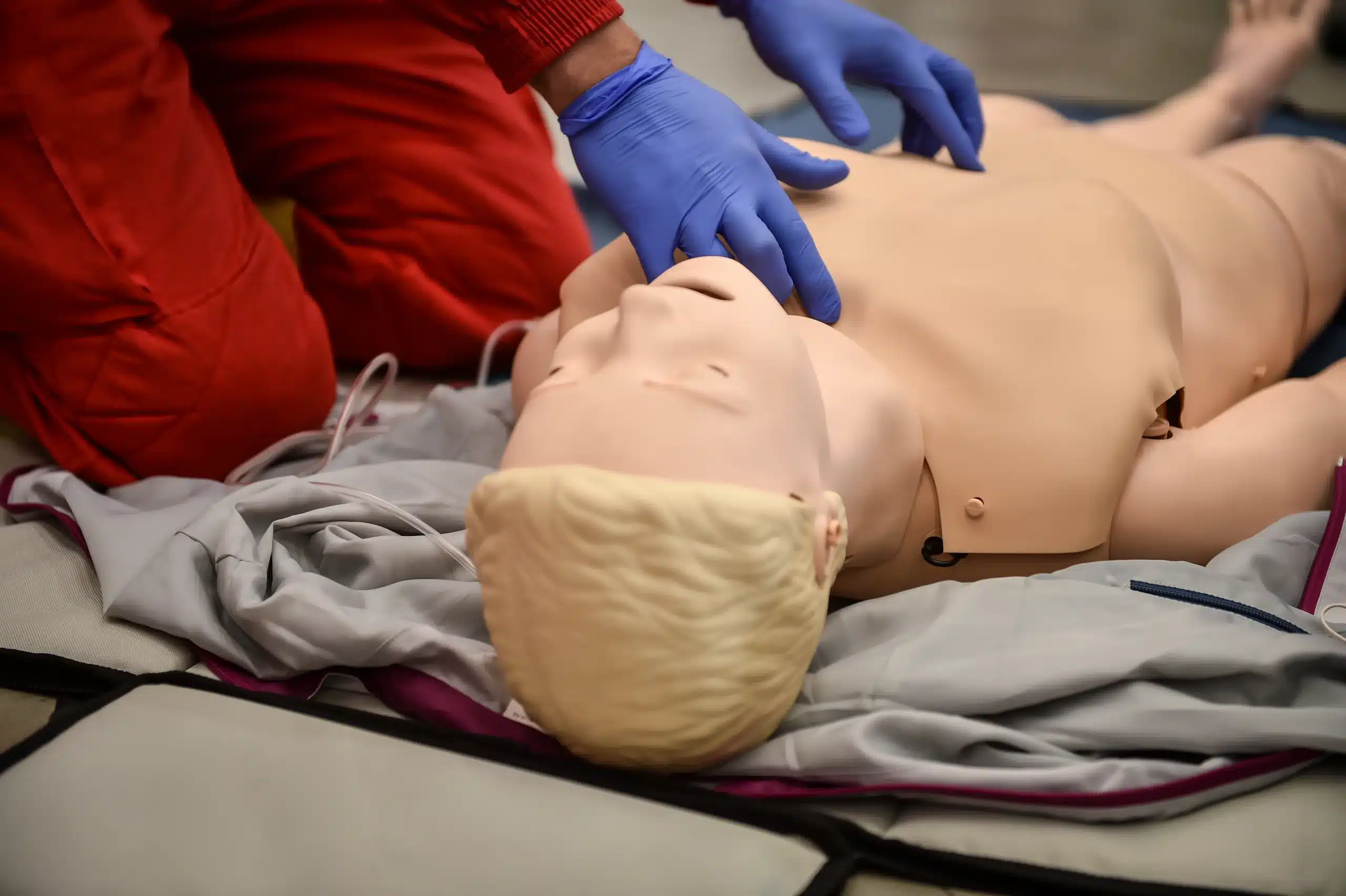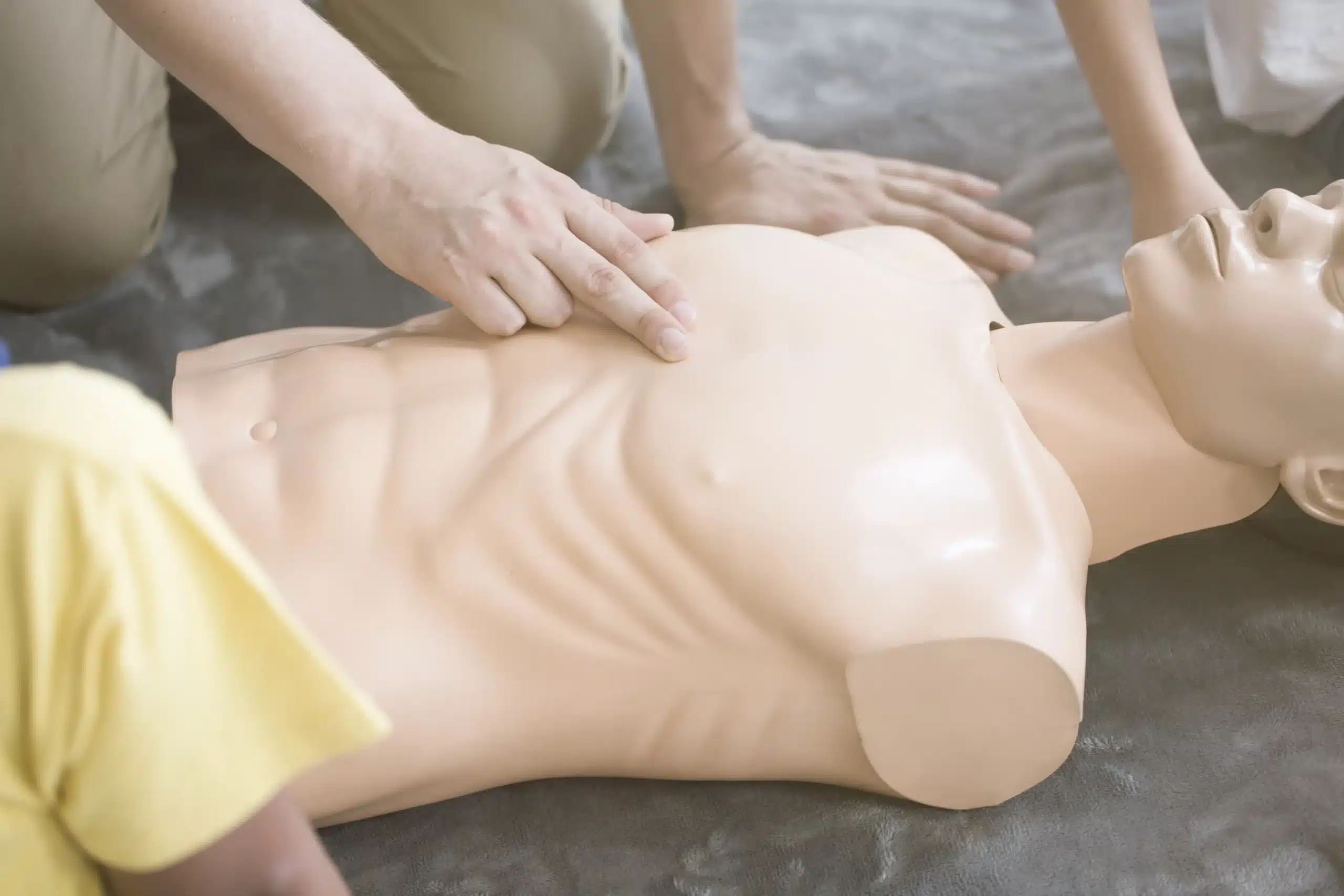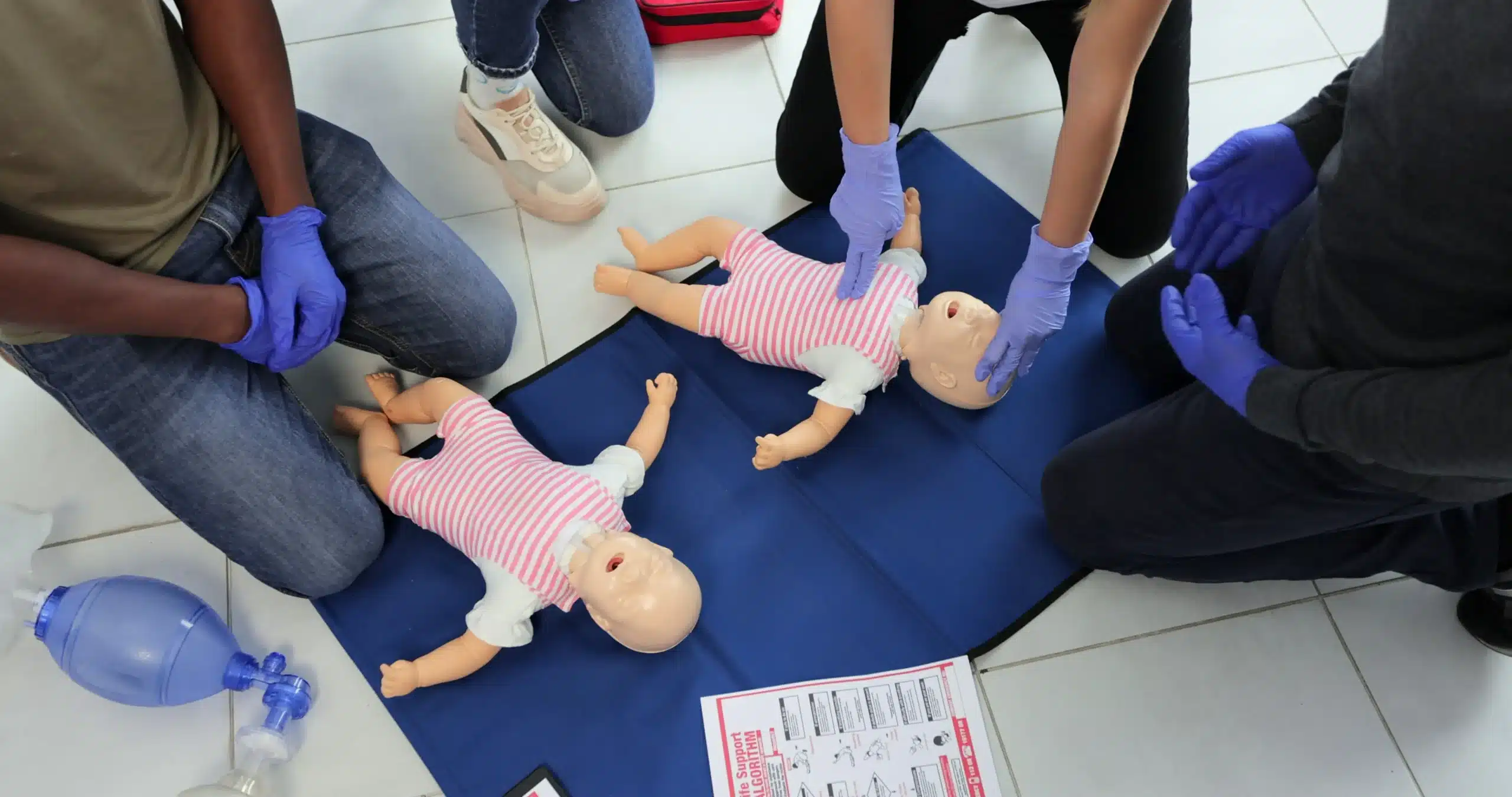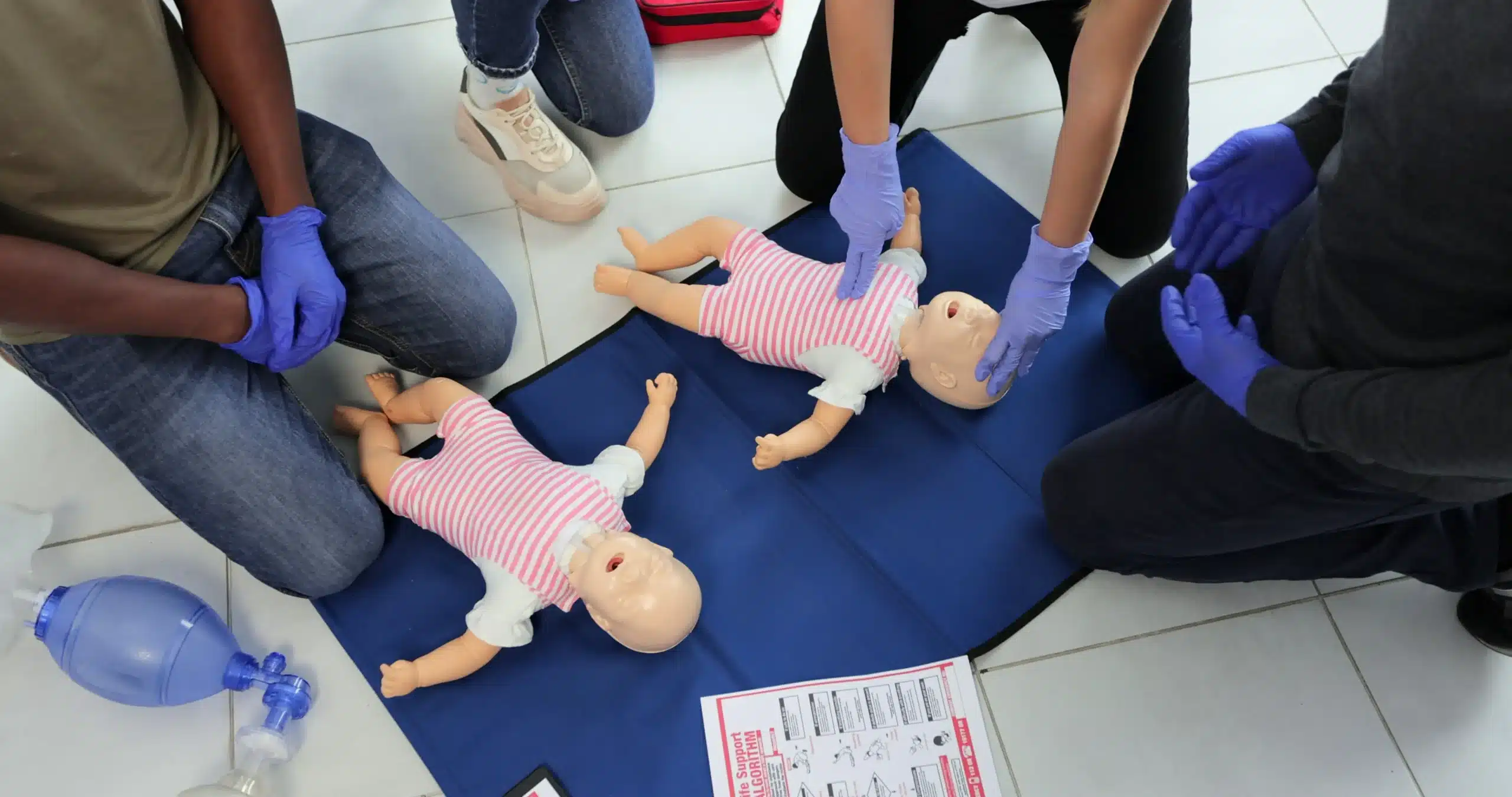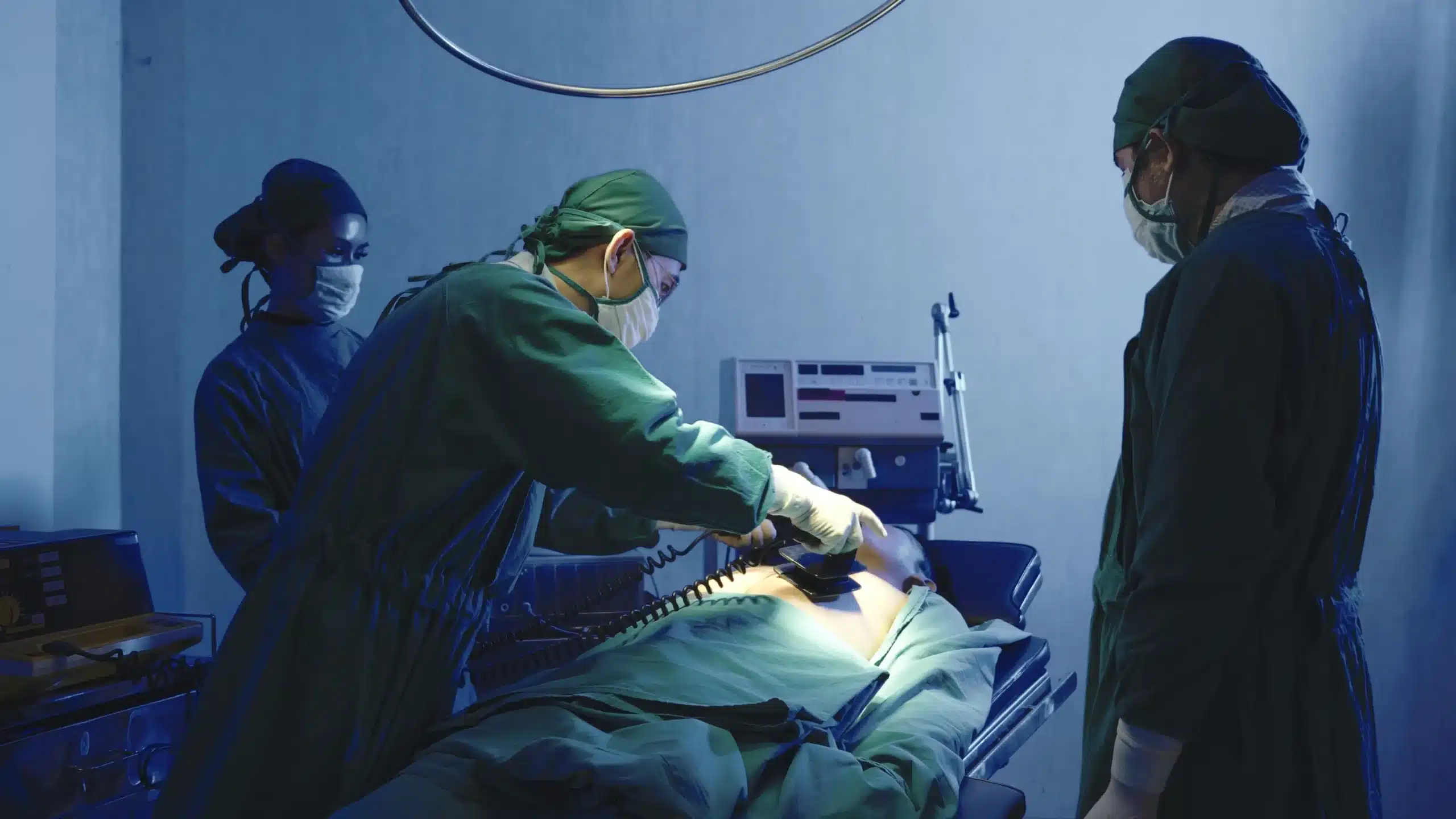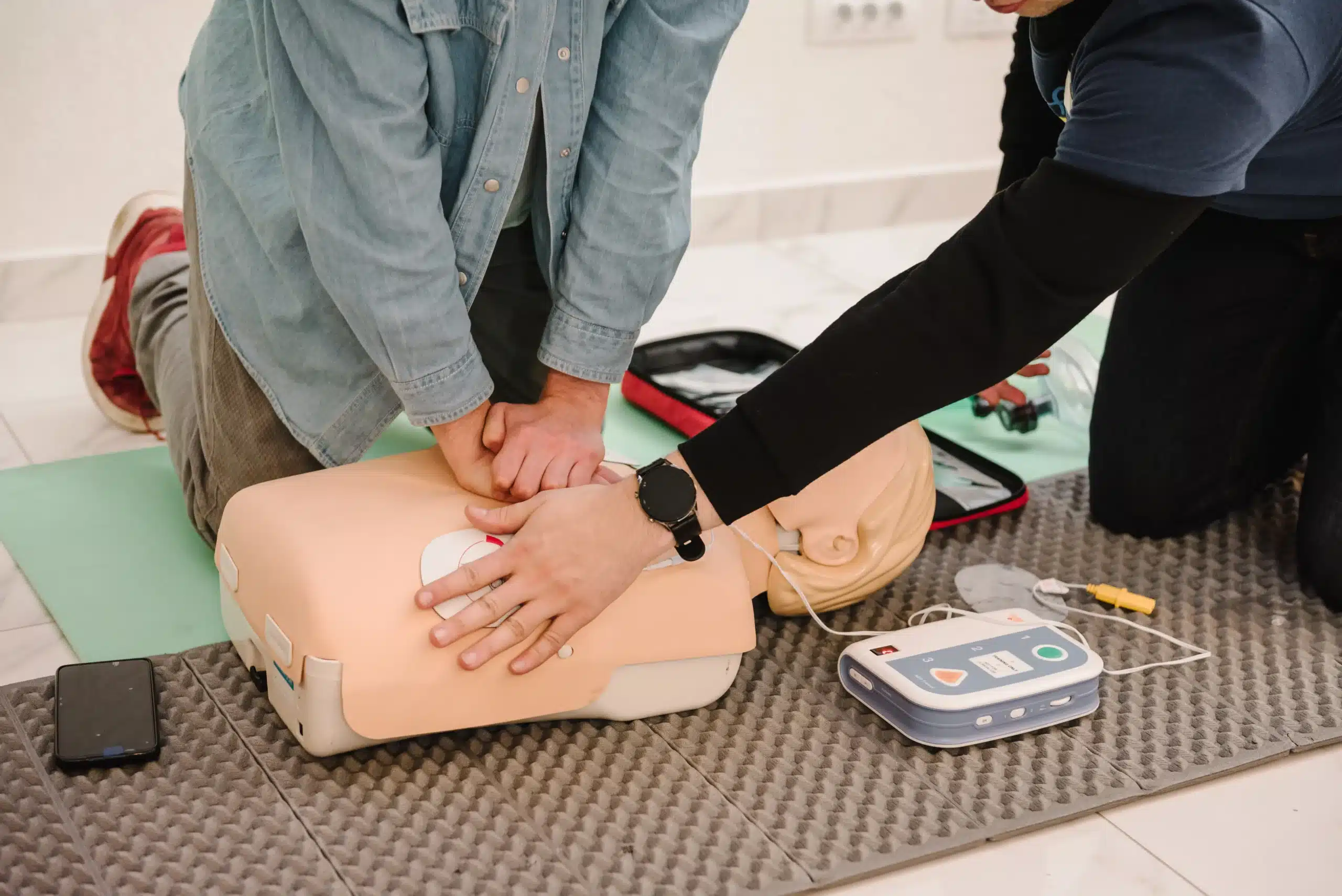Welcoming a newborn into your family is a beautiful and transformative experience. As you adjust to life as new parents in Alameda, you’re bombarded with information about feeding schedules, sleep training, and developmental milestones. But amidst all the advice, one crucial topic often gets overlooked: emergency preparedness. Knowing CPR and First Aid for new parents in Alameda is a skill that can make all the difference in a critical situation. It’s about equipping yourself with the knowledge and confidence to respond effectively if your baby or child ever faces a medical emergency. This article will guide you through the importance of these skills, where to find training in Alameda, and how to create a safer environment for your little one.
Key Takeaways
- Be prepared for anything: Knowing CPR and first aid empowers you to handle emergencies involving your little one, from choking incidents to everyday injuries. Quick action can make all the difference.
- Pediatric CPR requires specific techniques: Infants and children have unique needs. Learn the correct procedures for hand placement, compression depth, and addressing respiratory issues through specialized training.
- Find a CPR class that works for you: Several providers in Alameda offer flexible options, including in-person classes, online courses, and in-home training. Explore local resources and get certified today.
Why New Parents Need CPR and First Aid Skills
Becoming a parent brings immense joy, but also a whole new set of responsibilities. You’re now the guardian of a tiny human’s well-being, and that includes knowing how to handle emergencies. While we all hope never to face a situation requiring CPR or first aid, being prepared is crucial. For new parents, these skills aren’t just recommended—they’re essential.
Think about it: babies and toddlers explore the world with their mouths and hands, making choking hazards a constant concern. A seemingly harmless grape or a small toy can quickly become life-threatening. Knowing how to perform infant CPR and first aid for choking can make all the difference in these critical moments.
Beyond choking, countless other scenarios make CPR and first aid knowledge invaluable. Fevers, falls, burns, and allergic reactions are just a few examples of situations that can arise unexpectedly. As a new parent, you’ll want to feel confident responding effectively. Equipping yourself with the right skills provides immense peace of mind.
It’s easy to think, “It won’t happen to me,” or “I’ll just call 911.” But in emergencies, every second counts. CPR and first aid training empowers you to provide immediate care while waiting for professional help. This rapid response can significantly improve outcomes, especially in cases where the first few minutes are critical. Experts emphasize that any attempt at CPR is better than none.
Learning CPR isn’t just about memorizing steps; it’s about understanding the unique needs of infants and children. Babies have smaller airways and different physiological responses than adults. Infant CPR techniques are tailored to address these differences, ensuring effective oxygen delivery and circulation. A specialized course will teach you the correct procedures for infants, giving you the confidence to act swiftly and appropriately in a crisis.
CPR and First Aid Training Options in Alameda
Finding the right CPR and First Aid training can feel overwhelming, especially for new parents. Luckily, Alameda has several excellent resources available. Let’s break down a few options to help you find the perfect fit.
Safety Training Seminars
Safety Training Seminars offers a combined CPR and First Aid certification course for $140. This program covers essential life-saving skills for adults, children, and infants. They also offer discounts for group classes, which can be a great option for new parent groups or families wanting to learn together. Plus, they offer same-day certification, so you leave the class ready to respond to emergencies. Check their low price guarantee.
American Red Cross
The American Red Cross is a well-known provider of CPR and First Aid training, offering various courses, including options specifically designed for new parents and caregivers. You can explore their course offerings. While the Red Cross is a trusted name, comparing their pricing and course content with other local providers is always a good idea.
In-Home CPR Classes
For busy parents, In-Home CPR brings the training to you. They offer CPR, BLS, First Aid, and ACLS certification classes at your home or business in Alameda. Their instructors are experienced medical professionals, including EMTs, RNs, and paramedics. This personalized approach can be especially helpful for new parents who prefer one-on-one instruction.
Community Child Care Council (4Cs) of Alameda County
The 4Cs of Alameda County provides resources and training focused on child safety and development. While they may not offer CPR and First Aid certification themselves, they can connect you with valuable resources and training opportunities in the community. They are a great starting point for new parents looking for child safety information and support.
What is Pediatric CPR? Key Differences from Adult CPR
Pediatric CPR is a specific set of techniques used to revive infants and children who have stopped breathing or have a sudden cardiac arrest. While the basic principles of CPR are consistent across all age groups, there are crucial differences between adult and pediatric CPR that new parents in Alameda should understand. These differences are essential to provide safe and effective resuscitation. Attending pediatric CPR training can equip you with these lifesaving skills.
Hand Placement and Compression Depth
One of the most significant differences is hand placement and compression depth. For infants (under one year old), use two fingers placed at the center of the chest, just below the nipple line, to perform compressions. The chest should be compressed approximately 1.5 inches deep. For children (one year old to puberty), use the heel of one or two hands, depending on the child’s size, placed at the center of the chest. Compress the chest about two inches deep. These adjustments account for the smaller size and more delicate structure of a child’s chest.
Breath-to-Compression Ratio
The breath-to-compression ratio in pediatric CPR is similar to adult CPR: 30 chest compressions followed by two rescue breaths. Delivering gentle breaths is crucial, ensuring you see the chest rise with each breath. This 30:2 ratio applies to both single-rescuer and two-rescuer CPR for infants and children. For more information on the importance of infant CPR for parents, see this helpful article.
Special Considerations for Infants and Children
It’s important to remember that respiratory issues are a more common cause of cardiac arrest in infants than heart problems, which are more prevalent in adults. Obstructed airways, infections, and other respiratory distress situations can quickly escalate, requiring immediate intervention. Knowing how to perform infant CPR can be critical in these moments. Quick, effective CPR can significantly reduce the risk of brain damage or death. CPR training courses often cover these specific scenarios, giving parents the knowledge and confidence to respond appropriately.
CPR and First Aid Course Costs
Knowing the cost of CPR and first aid training can help you budget and plan for your certification. Several factors influence pricing, so let’s break down the typical costs associated with these courses in Alameda.
Standard Pricing
CPR and First Aid certification courses in Alameda usually start around $140. For example, Safety Training Seminars offers a combined CPR and First Aid certification at this price point, making it an affordable option for new parents. This combined course often covers adult, child, and infant CPR, giving you comprehensive life-saving skills. Remember that pricing can vary based on the provider and the specific certifications included.
Group Rates and Discounts
If you’re learning with a group, you might be able to save money. Many training providers in Alameda offer discounts for group bookings. Safety Training Seminars is one such provider, making it a convenient and cost-effective choice for families, parent groups, or friends who want to certify together. Check with your chosen provider about their group rates and minimum number of participants required for a discount. Local organizations like the Community Child Care Council (4Cs) of Alameda County and the American Red Cross may also offer group discounts.
Same-Day Certification Options
Need your certification quickly? Some courses offer same-day certification upon successful completion. Safety Training Seminars is known for providing same-day American Heart Association (AHA) certification cards, which can be especially helpful for new parents eager to have their certification in hand. This fast turnaround ensures you’re prepared for emergencies as soon as possible. When choosing a course, confirm with the provider whether they offer same-day certification.
What to Expect in a CPR and First Aid Class
Knowing what to expect can help you feel prepared and confident going into your first CPR and first aid class. Here’s a quick rundown of what your training will involve:
Hands-on Practice
CPR and first aid classes aren’t just lectures. You’ll learn by doing. Expect plenty of hands-on practice with mannequins, allowing you to get comfortable performing chest compressions, rescue breaths, and other essential techniques. This practical training is crucial for building muscle memory and confidence, so you’ll be prepared to act in a real emergency. Learning pediatric CPR and first aid is especially important for new parents and caregivers, equipping you to handle situations ranging from minor cuts and scrapes to more serious events like choking or cardiac arrest.
Certification Process
After completing the required training and demonstrating your skills, you’ll receive an AHA certification card. Safety Training Seminars offers same-day certification, meaning you’ll leave class with your card that day. This certification is typically valid for two years, after which you’ll need a refresher course to stay up-to-date.
Course Duration and Flexibility
CPR and first aid courses are designed to fit busy schedules. Training options often include in-person classes, online learning, or a blended approach. Classes are typically available on evenings and weekends, and many providers offer flexible scheduling with no minimum student requirements. A combined CPR and First Aid certification course usually takes a few hours to complete, covering essential skills like infant and child CPR, AED use, and how to respond to common childhood injuries and allergic reactions.
Essential First Aid Skills for New Parents
As a new parent, you’re responsible for a tiny, vulnerable human. It can feel overwhelming, but preparing yourself for common emergencies can give you valuable peace of mind. Knowing basic first aid can make all the difference in those critical moments. This section covers essential first aid skills every new parent in Alameda should know.
Choking Prevention and Response
Choking is a terrifying experience for both parent and child. For infants, keep small objects out of reach and always supervise them during feeding. Cut food into tiny, manageable pieces for toddlers. Learning how to respond to a choking incident is crucial. Pediatric CPR and first-aid training teaches you how to recognize the signs of choking and perform back blows and chest thrusts for infants, and abdominal thrusts (the Heimlich maneuver) for older children.
Treating Burns in Infants
Infants have delicate skin, making them susceptible to burns. Be extra cautious with hot liquids, surfaces, and appliances. If a burn does occur, immediately cool the area with cool (not cold) running water for several minutes. Never apply ice directly to the burn. Loosely cover the burn with a sterile gauze bandage. For anything more than a minor burn, seek immediate medical attention. First aid training will cover how to assess and treat different types of burns.
Handling Common Baby Injuries
Babies are naturally curious and, as they grow, become more mobile, increasing their risk of minor injuries. Falls, scrapes, and bumps are common occurrences. Knowing how to clean and dress a wound is essential. Keep a well-stocked first aid kit at home and learn how to use its contents. Pediatric first aid courses often cover how to handle common childhood injuries, including cuts, bruises, and head bumps, giving you the confidence to respond effectively.
Maintain Your CPR and First Aid Skills
Knowing CPR and first aid can give you confidence in an emergency. But like any skill, it’s important to keep your knowledge fresh. Regularly reviewing and practicing these techniques will help you stay prepared and respond effectively if you ever need to use them.
Refresher Courses
The best way to maintain your skills is by taking refresher courses. These classes reinforce core techniques and update you on any new guidelines. Even if you feel confident, a refresher can help you stay sharp and address any questions. It’s a worthwhile investment.
Practice Strategies at Home
Between refresher courses, practicing at home is key. While in-person training from a certified instructor is ideal, there are ways to reinforce your skills independently. Practice the physical steps of CPR on a pillow or stuffed animal. Talking through the steps aloud can also help. Even visualizing yourself responding to an emergency can be beneficial.
Online Resources and Apps
Many helpful online resources and apps can supplement your in-person training. Some offer interactive simulations and videos demonstrating proper techniques. Others provide quizzes and reminders. These resources offer a convenient and cost-effective way to keep your knowledge current and introduce CPR and first aid to family members.
Create a Safe Home Environment
As new parents, you’re understandably focused on your baby’s health and happiness. Creating a safe home environment is a critical part of that. While bumps and bruises are inevitable, many accidents are preventable. Taking proactive steps now can give you valuable peace of mind.
Childproofing Essentials
Start by thoroughly childproofing your home. Think of it as a scavenger hunt for potential hazards. Get down on your hands and knees to see the world from your baby’s perspective. Cover electrical outlets, secure heavy furniture to the walls, and install safety gates at the top and bottom of stairs. Cabinets and drawers containing cleaning supplies, medications, and sharp objects should have childproof locks. Don’t forget about seemingly harmless items like loose cords, tablecloths, and plastic bags, which can pose strangulation risks. For more comprehensive childproofing tips, check out HealthyChildren.org.
Emergency Preparedness for Families
Childproofing significantly reduces risks, but it’s still essential to be prepared for emergencies. Knowing pediatric CPR and first aid empowers you to respond quickly and effectively if an accident does happen. Incidents like choking, near-drowning, or sudden cardiac arrest can occur quickly and unexpectedly. Being trained to handle these situations can make all the difference. Keep a well-stocked first aid kit readily accessible, and post emergency contact numbers near your phone. Regularly review your CPR and first aid training materials and consider taking a refresher course to keep your skills sharp. Knowing you can handle an emergency will bring you confidence and help you stay calm if something unexpected occurs.
Local CPR and First Aid Training Providers
Finding the right CPR and First Aid training can feel overwhelming, but several excellent resources are available right here in Alameda. Here are a few local providers to consider:
Safety Training Seminars
Safety Training Seminars offers a range of training options, including American Heart Association certifications, same-day certification, and group discounts, making it a convenient choice for busy parents. They’re known for excellent customer service and competitive pricing. You can find their course schedule and register for CPR and First Aid classes on their website. They also offer EMSA Child Care Health and Safety training and a low price guarantee.
American Red Cross
The American Red Cross is a nationally recognized provider of CPR and First Aid training, offering courses essential for new parents. Their classes cover various topics, from basic life support to responding to emergencies involving infants and children. You can find a Red Cross class near you on their website.
EMC CPR Training
EMC CPR Training specializes in in-home CPR parties, creating a relaxed and comfortable learning environment. This option is especially great for groups of friends or family members who want to learn together. Their approach makes learning CPR more engaging and less intimidating. Visit their website for in-home CPR party scheduling and pricing.
In-Home CPR
In-Home CPR offers flexible training options, including CPR, BLS, First Aid, and ACLS certification classes held at your home or business in Alameda. This flexibility is particularly helpful for new parents with busy schedules. They also provide convenient on-site training for businesses and organizations.
Community Resources for New Parents in Alameda
Becoming a parent is a joyous but sometimes overwhelming experience. Luckily, Alameda offers new parents several resources for CPR and First Aid training, empowering them to handle emergencies involving infants and children. Knowing you can respond effectively brings invaluable peace of mind.
Safety Training Seminars stands out as a top provider in the area. They offer comprehensive CPR and First Aid training, including American Heart Association (AHA) certifications, with the added convenience of same-day certification and discounts for group classes. For busy parents, these flexible options make accessing high-quality training much easier. They also offer specialized courses like EMSA Child Care Health & Safety training.
Another excellent option for local parents is In-Home CPR. They bring the training to you, offering CPR, BLS, First Aid, and ACLS certification courses at your home or business in Alameda. Their instructors are experienced EMTs, RNs, or paramedics, ensuring personalized instruction. This personalized approach can be especially helpful for new parents who may feel more comfortable learning in a familiar environment.
If you’re looking for a fun and social way to learn with other parents, consider an in-home CPR party with EMC CPR Training. This format allows groups of parents and caregivers to learn together, fostering a sense of community and making the learning experience more engaging.
Many training providers in Alameda understand the time constraints and financial considerations of new parents. They offer various learning formats, including in-person classes, online courses, and blended learning options to accommodate different schedules. Some programs even provide discounts or reimbursement options for childcare providers, making these essential skills more accessible. Be sure to check with individual providers like Safety Training Seminars for details on available discounts and flexible payment options.
Related Articles
- How CPR Certification Prepares You for Emergencies – Alameda CPR Classes
- Pediatric CPR & First-Aid Training in Alameda – Alameda CPR Classes
- CPR & First-Aid Certification: Alameda Training Guide – Alameda CPR Classes
- First-Aid Training in Alameda: Your Complete Guide – Alameda CPR Classes
- CPR Training in Oakland: Your Guide to Certification – Alameda CPR Classes
Frequently Asked Questions
Why is CPR training especially important for new parents? Infants and young children are particularly vulnerable to choking hazards and other unexpected medical emergencies. CPR and first aid training equips parents with the skills to respond quickly and potentially save their child’s life in critical situations. Knowing how to react can significantly improve outcomes while waiting for professional medical help to arrive.
What key things will I learn in a CPR and first aid class designed for new parents? You’ll learn how to perform CPR on infants and children, including techniques like chest compressions and rescue breaths. The class will also cover how to recognize and respond to choking, common childhood injuries (burns, cuts, falls), allergic reactions, and other emergencies. Many courses also include information on creating a safe home environment and preventing accidents.
How much do CPR and first aid certification courses typically cost, and are there ways to save money? Costs vary depending on the provider and location, but courses in Alameda, CA, often start around $140. Look for providers offering group discounts, which can be a great option for families or parent groups learning together. Some organizations may also offer discounts for childcare providers. It’s always wise to compare pricing and course content from different providers before registering.
How long does certification last, and how can I maintain my skills after completing a course? CPR and first aid certifications are typically valid for two years. To maintain your skills, consider taking refresher courses before your certification expires. Regularly practicing the techniques at home, even with a pillow or stuffed animal, can help reinforce what you’ve learned. Online resources and apps can also provide valuable refreshers and updates on any new guidelines.
What if I’m nervous about taking a CPR class or not sure I can handle an emergency? It’s completely normal to feel a little apprehensive. Remember, these courses are designed for people with no prior medical experience. Instructors create a supportive learning environment, and the hands-on practice helps build confidence. Knowing you have these skills can empower you to act quickly and calmly in a crisis, even if you’re initially nervous. Any attempt at CPR is better than none, and your efforts can make a real difference.


